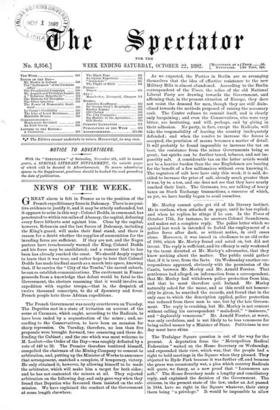Mr. Morley cannot quite get rid of his literary instinct.
He is restless, when attacked on paper, until he has replied ; and when he replies, he stings if he can. In the Times of October 17th, for instance, he answers Colonel Saunderson, and makes out a complete reply. The police letter which we quoted last week is intended to forbid the employment of a police force after dark, or without notice, in civil cases alone. Moreover, it was issued in obedience to an old order of 1886, which Mr. Morley found and acted on, but did not invent. The reply is sufficient, and its efficacy is only weakened by the taunt directed at Mr. Morley's adversaries, that they knew nothing about the matter. The public could gather that, if it is true, from the facts. On Wednesday another cor- respondence appeared, obviously with the permission of the Castle, between Mr. Morley and Mr. Arnold Forster. That gentleman had alleged, on information from a correspondent, that Mr. Morley had withdrawn police protection from him, and that he must therefore quit Ireland. Mr. Morley naturally asked for the name, and as this could not honour- ably be given, he searched the records, and found that in the only case to which the description applied, police protection was reduced from three men to one, but by the late Govern- ment. The reply is crushing, but Mr. Morley is not content without calling his correspondent "maladroit," "insincere," and "deplorably venomous." Mr. Arnold Forster, at worst, was only credulous, and is not likely to be less venomous for being called names by a Minister of State. Politicians in our day muet have skins.






































